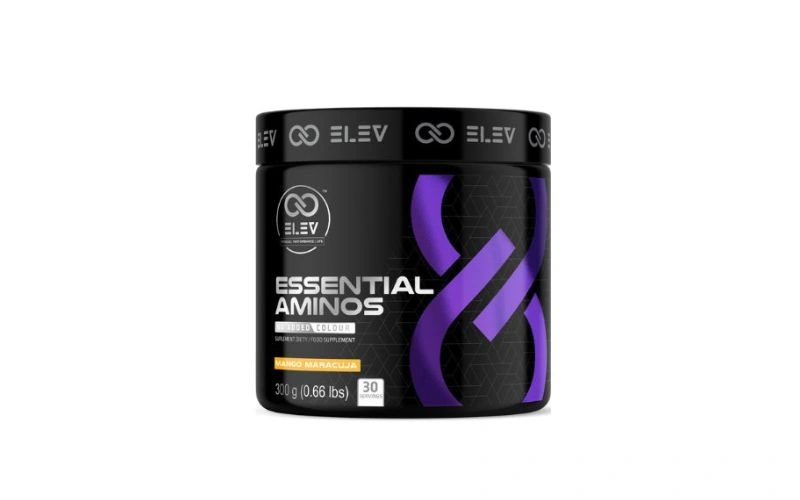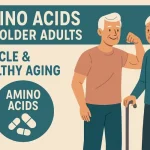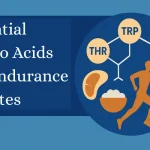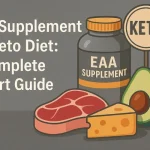Managing appetite is one of the hardest parts of weight loss. Cravings hit at the wrong time, hunger spikes randomly, and emotional eating makes everything worse. Among the scientific strategies that actually work, one surprising tool is gaining popularity: amino acid supplements.
These natural building blocks of protein don’t just support muscle health they also influence appetite, cravings, and satiety signals. Here’s a complete guide to how they work, which amino acids are most effective, and how to use them safely.
Table of Contents
What Are Amino Acids & How Do They Influence Appetite?
Amino acids are the molecules that build protein. Your body uses them to make hormones, neurotransmitters, enzymes, and tissues. What most people don’t know is their direct connection to hunger regulation.
Here’s how amino acids affect appetite:
- Ghrelin: the “hunger hormone,” released when your stomach is empty
- Leptin: tells your brain you’re full
- Serotonin: reduces cravings and emotional eating
- Insulin: regulates blood sugar (unstable sugar = more cravings)
Certain amino acids can modulate these hormones, making you feel full faster, stay satisfied longer, and crave less sugar. That’s where supplements come in.
How Amino Acid Supplements Help Curb Appetite

Amino acids influence appetite through several biological pathways:
Serotonin Boosting
Tryptophan converts into serotonin, the “feel-good” neurotransmitter. Higher serotonin levels reduce cravings and emotional eating. It also helps prevent late-night snacking by improving mood stability.
Blood Sugar Stabilization
Glutamine helps maintain steady blood glucose levels. This reduces sudden hunger spikes that trigger overeating. It also supports consistent energy, preventing cravings from fatigue.
Increased Satiety Signals
Leucine activates mTOR pathways that signal fullness to the brain. This helps you feel satisfied sooner during meals. It naturally reduces overeating by boosting satiety responses.
Stress & Cortisol Reduction
Tyrosine supports dopamine and norepinephrine balance during stress. This reduces emotional eating triggered by anxiety or fatigue. Balanced stress hormones help stop the stress-eating cycle.
Muscle Preservation During Dieting
When your body preserves lean mass, appetite naturally reduces—BCAAs help with this. Together, these effects make amino acid supplements a powerful, natural appetite-management tool.
Best Amino Acids for Appetite Control
Below are the most effective amino acids with proven appetite-suppressing benefits:
1. L-Glutamine
- Reduces sugar cravings
- Stabilizes blood sugar
- Helps with emotional eating
- Supports gut health
2. Tryptophan
- Converts to serotonin
- Reduces appetite
- Helps with mood-related eating
3. L-Tyrosine
- Supports mental clarity
- Reduces stress eating
- Helps with dopamine balance
4. L-Carnitine
- Improves fat metabolism
- Enhances energy during calorie deficits
- Helps reduce fatigue-driven overeating
5. Leucine / BCAAs
- Increases satiety
- Helps maintain muscle (reducing hunger during dieting)
- Great for workout days
These amino acids can be taken individually or as part of a blend.
Amino Acid Supplements vs Other Appetite Suppressors
| Supplement Type | Works For | Downsides |
| Amino acids | Cravings, hunger, mood-related eating, fasting support | Need consistency |
| Fat burners | Energy, thermogenesis | Side effects & caffeine crash |
| Protein shakes | Fullness, meal replacement | Extra calories |
| Herbal suppressants | Mild craving control | Limited research |
Amino acids stand out because they work naturally, support muscle health, have fewer side effects than typical appetite suppressants, remain effective even during fasting, and simultaneously help improve mood while reducing cravings.
Benefits of Amino Acid Supplements for Hunger Control
Amino acid supplements can reduce appetite throughout the day, prevent sugar crashes and snacking, control late-night cravings, and help maintain steady energy levels during dieting. They also support lean muscle, which naturally keeps appetite more stable, while reducing emotional and stress-driven eating. Their ability to work alongside intermittent fasting makes them a versatile and smart choice for overall weight management.
How to Use Amino Acid Supplements for Appetite Control
To use amino acids for appetite control, take them in the morning, before meals, during intermittent fasting, or before workouts to reduce hunger and cravings. Use general doses like glutamine 3–5g, tyrosine 500–1500mg, tryptophan 250–500mg, carnitine 1–2g, and BCAAs 5–10g. Take tyrosine and carnitine on an empty stomach, tryptophan with carbs, glutamine anytime, and BCAAs around workouts, and stay well-hydrated for better absorption.
Side Effects & Safety Considerations
Amino acids are generally safe, but some people may experience mild stomach discomfort, occasional headaches, sleepiness from tryptophan, or jitteriness if taking high doses of tyrosine. They should be avoided by individuals who are pregnant or breastfeeding, those using antidepressants (especially SSRIs due to tryptophan interactions), or anyone with serious kidney or liver issues. It’s always best to start with a low dose to assess your tolerance.
Natural Food Sources of Appetite-Controlling Amino Acids
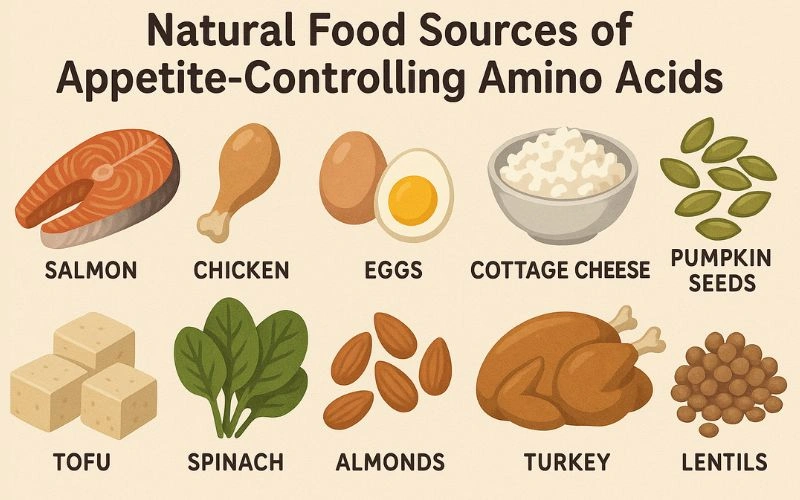
Amino-acid–rich foods play a major role in managing hunger and increasing satiety:
- Eggs provide complete proteins that help regulate appetite hormones.
- Chicken and turkey offer lean protein that keeps you full for hours.
- Lentils, oats, and quinoa supply plant-based amino acids and slow-digesting fiber that stabilizes blood sugar.
- Greek yogurt and cottage cheese are high in casein and whey, which curb cravings and support muscle repair.
- Fish, especially salmon and tuna, delivers protein plus healthy fats that promote long-lasting fullness.
- Almonds and peanut butter provide amino acids and healthy fats that slow digestion.
Overall, including these high-protein foods in your meals naturally increases satiety and helps control appetite throughout the day.
FAQs About Amino Acid Supplements for Appetite Control
1. Are amino acids safe for daily use?
Yes, most amino acids are safe for daily use when taken in recommended doses. Just avoid excessive intake and consult a professional if you have medical conditions.
2. Which amino acid reduces cravings the fastest?
Glutamine helps reduce sugar cravings quickly, while tryptophan supports mood-related cravings. Both are considered fast-acting for appetite control.
3. Can amino acids help during intermittent fasting?
Yes, especially glutamine and BCAAs, which help manage cravings and maintain energy. BCAAs may break a strict fast, but are fine for performance-focused fasting.
Final Verdict: Are Amino Acid Supplements Effective for Curbing Appetite?
Yes, amino acid supplements can be a powerful, natural solution for managing hunger, reducing cravings, and supporting weight loss. They work through multiple pathways: stabilizing blood sugar, boosting serotonin, improving satiety, and reducing stress eating.
They’re not magic pills, but when combined with the right habits of hydration, fiber, good sleep, and balanced meals they can significantly improve appetite control and make weight management much easier.















